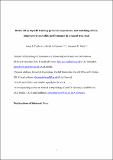Files in this item
Better all by myself : gaining personal experience, not watching others, improves 3-year-olds’ performance in a causal trap task
Item metadata
| dc.contributor.author | Yuniarto, Laras | |
| dc.contributor.author | Gerson, Sarah | |
| dc.contributor.author | Seed, Amanda Madeleine | |
| dc.date.accessioned | 2021-02-18T00:37:47Z | |
| dc.date.available | 2021-02-18T00:37:47Z | |
| dc.date.issued | 2020-06 | |
| dc.identifier | 264571048 | |
| dc.identifier | 240c89bd-0c1c-4613-85f0-2d505fa40d71 | |
| dc.identifier | 000528203100003 | |
| dc.identifier | 000528203100003 | |
| dc.identifier | 85079532100 | |
| dc.identifier.citation | Yuniarto , L , Gerson , S & Seed , A M 2020 , ' Better all by myself : gaining personal experience, not watching others, improves 3-year-olds’ performance in a causal trap task ' , Journal of Experimental Child Psychology , vol. 194 . https://doi.org/10.1016/j.jecp.2019.104792 | en |
| dc.identifier.issn | 0022-0965 | |
| dc.identifier.other | ORCID: /0000-0002-3867-3003/work/69834797 | |
| dc.identifier.other | ORCID: /0000-0002-9221-6938/work/118800411 | |
| dc.identifier.uri | https://hdl.handle.net/10023/21444 | |
| dc.description | This work was supported by the European Research Council (ERC) under the European Union’s Horizon 2020 research and innovation programme (grant agreement No. 639072). | en |
| dc.description.abstract | Children often learn from others’ demonstrations, but in the causal domain evidence acquired from observing others may be more ambiguous than evidence generated for oneself. Prior work involving tool-using tasks suggests that observational learning might not provide sufficient information about the causal relations involved, but it remains unclear whether these limitations can be mitigated by providing demonstrations using familiar manual actions rather than unfamiliar tools. We provided 2.5- to 3.5-year-old children (N = 67) with the opportunity to acquire experience with a causal trap task by hand or by tool actively or from observing others. Initially, children either generated their own experience or watched a yoked demonstration; all children then attempted the trap task with the tool. Children who generated their own experience outperformed those who watched the demonstration. Hand or tool use had no effect on performance with a tool. The implications of these findings for scaffolding self-guided learning and for demonstrations involving errors are discussed. | |
| dc.format.extent | 10 | |
| dc.format.extent | 467271 | |
| dc.language.iso | eng | |
| dc.relation.ispartof | Journal of Experimental Child Psychology | en |
| dc.subject | Children | en |
| dc.subject | Tool use | en |
| dc.subject | Observational learning | en |
| dc.subject | Active learning | en |
| dc.subject | Causal learning | en |
| dc.subject | BF Psychology | en |
| dc.subject | DAS | en |
| dc.subject.lcc | BF | en |
| dc.title | Better all by myself : gaining personal experience, not watching others, improves 3-year-olds’ performance in a causal trap task | en |
| dc.type | Journal article | en |
| dc.contributor.sponsor | European Research Council | en |
| dc.contributor.institution | University of St Andrews. School of Psychology and Neuroscience | en |
| dc.contributor.institution | University of St Andrews. ‘Living Links to Human Evolution’ Research Centre | en |
| dc.contributor.institution | University of St Andrews. Centre for Social Learning & Cognitive Evolution | en |
| dc.contributor.institution | University of St Andrews. Institute of Behavioural and Neural Sciences | en |
| dc.identifier.doi | 10.1016/j.jecp.2019.104792 | |
| dc.description.status | Peer reviewed | en |
| dc.date.embargoedUntil | 2021-02-18 | |
| dc.identifier.grantnumber | 639072 | en |
This item appears in the following Collection(s)
Items in the St Andrews Research Repository are protected by copyright, with all rights reserved, unless otherwise indicated.

